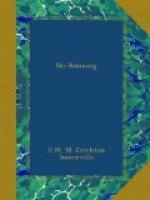By this time some one or two of the watchers had gone home nearly frozen, leaving all possible clothing on the injured man. Three others stayed and rubbed him without intermission, which probably saved his life and limbs. The doctor had brought a splint which he put on by light of an electric torch and the man was taken to the station and sent off at once to the hospital.
Now, all this happened within a mile of home where help was handy. Such accidents happening several miles from home may have far more serious consequences, and every Ski runner, who scoffs at the precautions of people more fussy than themselves, may very likely have the life or limb of someone else on their mind when, had they been a little more fussy, they might have saved it.
Not only that, the selfish runner, who travels light, may well be a serious burden to others and risk their safety and comfort through his own foolhardiness.
Ski-ing is a game which sorts people out, and where the character of people like sailors, who know what it is to face the elements, shows up well against the civilian, whose greatest risk in life at home is crossing a street at a busy hour.
People may ski for years without getting hurt, and the experienced runner probably hurts himself less than the beginner. Yet it is the experienced runner who carries the gear, the beginner it is who usually scoffs and takes risks, not only to himself, but to the people who have to go out to look for him when he is benighted or hurt.
CARE OF EQUIPMENT
Skis call for a good deal of attention if one takes the game seriously. People who only come out for a fortnight and who hire any pair of Skis, which they treat as they would the floor of an omnibus, have no appreciation of how much attention Skis need, if they are to be really dependable in all sorts of snow.
New Skis should be well-oiled with two or three coats of Linseed oil, which should dry between each coat. I think hickory needs the oil just as much as ash, but some people disagree with this. The oil hardly goes beyond the surface of the wood and soon rubs off on hard snow, but it preserves the wood as well as giving a slipping surface so long as it lasts. Newly oiled Skis when dry need very little further attention for a few days, as they will run well over all sorts of snow.
When there is no time to oil, because the Skis are in daily use, wax can be ironed in. Most good sports hotels now provide a bench with an electric iron in a special heated and lighted room where the Ski-runner can work happily after tea, or on a snowy day. If no such room be provided, it should be clamoured for, because the waxing of Skis is a much more difficult job without it. The patent iron “Para” is helpful where no electric iron is provided. “Para” is an oblong perforated metal box with a handle which screws in. A lump of Meta (solid spirit fuel) is lighted and put inside and the iron becomes hot and is rubbed up and down the Ski, while wax is pressed against it and dribbled on to the wood.




